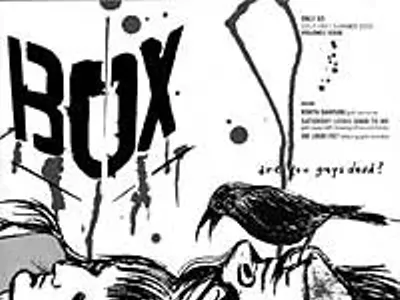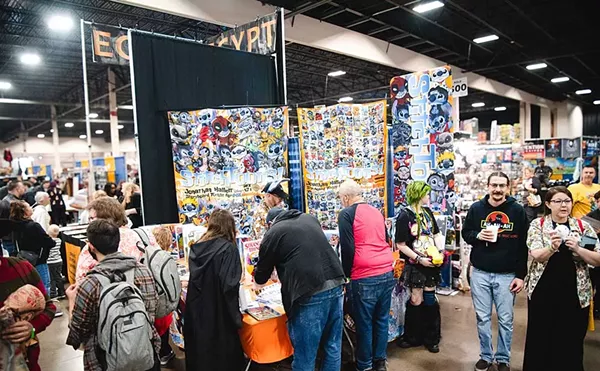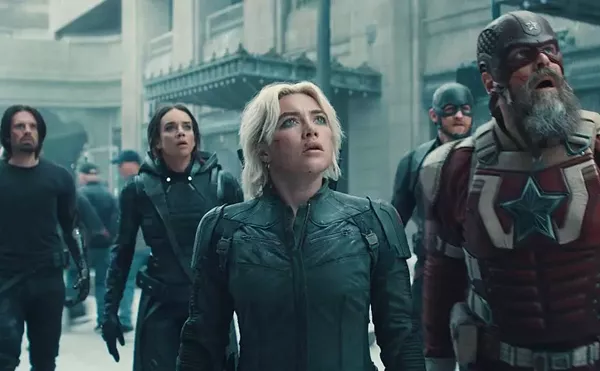
Audio By Carbonatix
[
{
"name": "GPT - Leaderboard - Inline - Content",
"component": "35519556",
"insertPoint": "5th",
"startingPoint": "3",
"requiredCountToDisplay": "3",
"maxInsertions": 100,
"adList": [
{
"adPreset": "LeaderboardInline"
}
]
}
]
“Aaron — I really can’t see the humor in explaining to my professor why my homework has pornography taped to it,” begins an anonymous note on a ripped sheet of loose-leaf paper. After elaborating on Aaron’s pranks, the writer concludes, with a half smiley-face, “Please make sure these kind of things stop.”
Notes like this are Davy Rothbart’s business. The 30-year old Ann Arbor native is the creator of Found Magazine, a popular online publication (foundmagazine.com) that celebrates the beauty of left-behind items. Found, which began in 2001, is a collection of discarded notes, lists and photos unearthed by readers from all over the world. Raw and unself-conscious, Found’s material runs the gamut from heartbreaking to hilarious. What began as a zine has now burgeoned into the book Found: The Best Lost, Tossed, and Forgotten Items from Around the World, a sister Web site that specializes in sleazy Polaroids, abandoned lust-notes (dirtyfound.com), and frequent appearances on NPR’s This American Life.
Rothbart, who’s dreamed of writing for a living, recently published his first collection of short stories, The Lone Surfer of Montana, Kansas. Its eight stories are largely inspired by what Rothbart calls “found moments” — brief, fleeting interactions shared with strangers while roaming around the country. Reading like a fever-dream travelogue, The Lone Surfer’s tales unfold at a frenetic pace, jerking the reader from Chicago to Florida to the titular town of Montana, Kansas.
Most of them read like the literary equivalent of Found material. “How I Got Here” is structured as a prison inmate’s assignment for a jailhouse creative writing class. It’s also a grammarian’s nightmare, written entirely in caps with sentence fragments and lots of exclamation marks. “Maggie Fever” delves into the relationship that can develop between finder and object. The story follows a teenage boy as he becomes obsessed with journals and mixtapes he uncovers within a stolen green backpack — and the girl who lost it. Like many of the other stories, it has an “almost-true” quality that flirts with gonzo autobiography.
When asked about his literary inspirations, Rothbart mentions The Basketball Diaries author Jim Carroll, short stories by Denis Johnson (one of which became the 1999 movie Jesus’ Son), and, of course, road novelist Jack Kerouac, “even though everyone’s always hating on him.” He also namechecks William Penn DuBois’s young adult classic, The 21 Balloons. “There’s this quote in the beginning of that book that I really like,” Rothbart says. “It goes, ‘Half of this book is true, and the other half may very well have happened.’”
Ultimately, it’s this seamless blend of fact and fiction that makes the tales in The Lone Surfer so captivating. As Rothbart says, “Imagine you were sitting on the back of a Greyhound bus, going through Arizona at night, and there’s some dude sitting in the back who had a tall can of, like, St. Ives, and he was telling you stories about his life. That’s how I hope my stories read.”
When he’s not combing the parking lots and laundermats of America for inspiration, Rothbart is working on a “rap opera” inspired by the interlocking narratives of The Streets’ A Grand Don’t Come for Free and based on the story of a friend who volunteered for a yearlong conservation program in Porterville, Calif., only to realize too late that it was a diversionary program for juvenile offenders.
He’s also now touring with his younger brother, Peter, staging “rowdy reading and music events.” The audience for the Rothbarts’ Friday performance at the 555 Gallery can plan on hearing interpretive readings of some of Davy’s favorite found notes, as well as excerpts from The Lone Surfer. Peter, a guitarist and singer, serenades with songs inspired by the found notes. The show’s highlights, Davy says, are Peter’s “folk ballad” covers of a DIY rap mixtape found in a parking lot in Ypsilanti, which include gems such as “The Booty Don’t Stop” and “Wiggle on the Flo.”
Asked why found materials have become a cultural phenomenon, Rothbart says, “There’s a stigma against being a voyeur, but I really think it’s a natural instinct. Being curious about people who share the world with us is a good thing. It’s healthy.”
He concludes, laughing. “A friend once told me that Found Magazine is like reality TV, except real.”
8 p.m. Friday, Oct. 7. 555 Gallery, 4884 Grand River; 313-894-4202. Music by Karl Pestka and Al-Iqaa.
Monica Price is a Metro Times editorial intern. Send comments to letters@metrotimes.com




